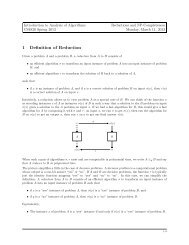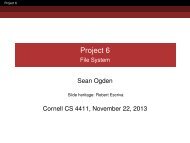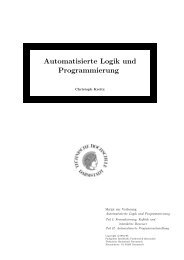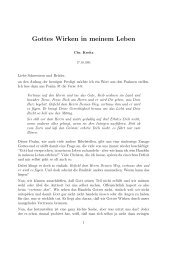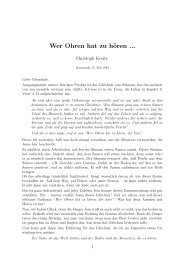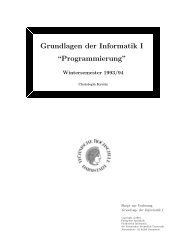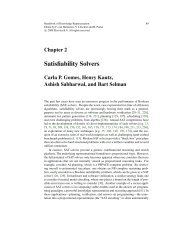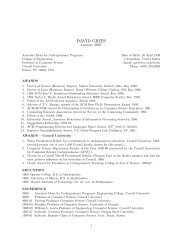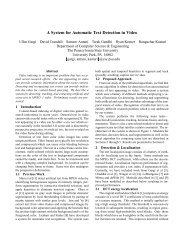II. Notes on Data Structuring * - Cornell University
II. Notes on Data Structuring * - Cornell University
II. Notes on Data Structuring * - Cornell University
Create successful ePaper yourself
Turn your PDF publications into a flip-book with our unique Google optimized e-Paper software.
9.2. EXAMPLE<br />
NOTES ON DATA STRUCTURING 1,47<br />
A source text for an expressi<strong>on</strong> in a programming language is presented<br />
as a sequence of symbols defined:<br />
type symbol = (c<strong>on</strong>stant:(value: real), variable:(identifier:ident),<br />
op" operator, leftbracket, rightbracket);<br />
Write a program operating <strong>on</strong> an input variable<br />
source:sequence symbol,<br />
which reads from its beginning the l<strong>on</strong>gest possible legitimate expressi<strong>on</strong>,<br />
delivers the corresp<strong>on</strong>ding abstract expressi<strong>on</strong> as a result, and exits to the<br />
label error if this is impossible. The structure of the result and the syntax of<br />
the source are as specified earlier in this chapter.<br />
The structure of the program closely follows that of the desired result.<br />
There are three functi<strong>on</strong>s:<br />
compile expressi<strong>on</strong><br />
compile term (sign)<br />
compile primary<br />
each of which removes from the source the l<strong>on</strong>gest expressi<strong>on</strong> in its syntactic<br />
category, and delivers the corresp<strong>on</strong>ding abstract structure as a resulf. The<br />
main irregularity of the process is that the first term of an expressi<strong>on</strong> may be<br />
unsigned; this is why the sign is provided as a parameter for compile term,<br />
instead of being read from source by compile term itself. Each functi<strong>on</strong> has<br />
the side-effect of shortening the source sequence if successful, and jumping<br />
to error if not.<br />
functi<strong>on</strong> compile expressi<strong>on</strong>: expressi<strong>on</strong>;<br />
begin sign" operator;<br />
end;<br />
if source, first = plus v source, first = minus then sign from source<br />
compile expressi<strong>on</strong>:= [compile term (sign)];<br />
else sign: = plus;<br />
while source, first = plus v source.first = minus do<br />
begin sign from source;<br />
end<br />
functi<strong>on</strong> compile term (s: operator): term;<br />
compile expressi<strong>on</strong> :''[compile term (sign)]<br />
begin p" primary; sign" operator; fs" sequence factor;



